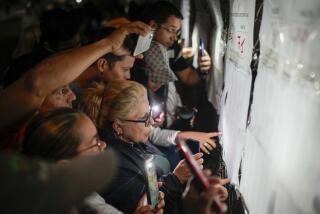POLITICS : Hopeful Voters Face Hurdles in El Salvador : A cumbersome registration system is snarling preparations for landmark elections next March. Tens of thousands of citizens may be left out of the democratic loop.
SAN SALVADOR — Along the palm-shaded patio of City Hall, scores of Salvadorans line up every day in an often frustrating quest to register to vote for what many believe will be this country’s most important elections ever.
Emerging from more than a decade of devastating civil war, El Salvador will hold elections in March to choose a president, all 84 legislators and more than 200 mayors nationwide. The voting is seen as a major test for building peacetime democracy here and restoring public confidence in elections after years of fraud and military coups.
Yet the electoral process, so far, has been plagued by a cumbersome, deficient system for registering voters, which threatens to strand tens of thousands of Salvadorans outside the democratic loop.
More than 700,000 eligible voters--almost 30% of the electorate--are not registered. Opposition political parties accuse the government-dominated national election tribunal, which oversees registration as well as the actual voting, of deliberately throwing up obstacles to wider participation as a way of maintaining the status quo.
“If the 1994 electoral process fails, it will be very difficult to salvage the peace process,” said Luis Felipe Alam, liaison to the election tribunal for the opposition Christian Democratic Party.
President Alfredo Cristiani, who won election in 1989 by a 500,000-vote margin, said the accusations are merely a political “smoke screen” to justify anticipated losses.
Cristiani’s party, the right-wing Nationalist Republican Alliance (Arena), now leads in all polls over both the Christian Democrats and a leftist coalition that includes the former guerrillas who fought a series of governments until United Nations-brokered accords ended the war last year.
Whether deliberate or not, registration has not been made easy. And it is further complicated by the fact that the guerrillas during the war destroyed dozens of city halls and the public records they housed.
Potential voters must present a birth certificate (which many Salvadorans simply don’t have) or a national identification document, fill out forms and then return at a later date to pick up a voting card that entitles them to cast a ballot. Many who can take the time and spend the money to return often find the card is not ready.
Gilberto Perez Lazo’s story is typical. The 26-year-old student registered a month ago and has returned twice to City Hall in downtown San Salvador to pick up the card, only to be told to come back again. The frustration is slowly wearing down his eager determination to vote for the first time in a Salvadoran election.
“Voting in years past was a joke, but this year it could be decisive,” Perez Lazo said as he stood in line, again, in an unsuccessful attempt to pick up his voter card. “But I am getting fed up. They keep telling me to come back. I want to vote, but so far this hasn’t worked for me.”
While people like Perez Lazo may not make it onto the official voter rolls in time, other people who are dead--like reputed death squad organizer Roberto D’Aubuisson--are included, and still others are registered two or more times. The dead and duplicates have raised fears of fraud, but U.S. and U.N. monitors say the failure to register tens of thousands of people is a far greater threat to fair and representative elections.
The deadline for registering is Nov. 20. At its best, the tribunal has managed to register 60,000 people in a single month.
American officials grew so dismayed at the inefficiency of the election tribunal that Congress temporarily froze about $70 million in aid to pressure Salvadoran officials to improve the procedures.
Peter Romero, until recently the top American diplomat in El Salvador, took the rare step of airing his complaints publicly, which prompted angry retorts from ruling party election officials. “It is absolutely essential,” Romero said in an interview, “that this country have elections that close one chapter, the chapter of conflict, and open a new chapter of participatory democracy and lasting reconciliation.”
There have been sporadic efforts aimed at giving Salvadorans who live outside the country the right to vote in national elections. The government is thought to be lukewarm to the idea, while the left supports it enthusiastically, banking on an unproven notion that many of the estimated 1 million Salvadorans in exile would support leftist candidates.
The issue of voting by expatriates became moot this year, however, when organizations involved in the elections chose to focus their energies instead on the bigger problem of registration.
More to Read
Sign up for Essential California
The most important California stories and recommendations in your inbox every morning.
You may occasionally receive promotional content from the Los Angeles Times.











